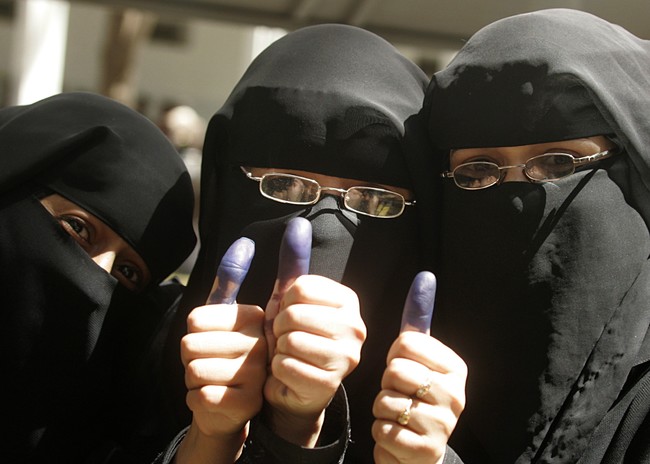
By: Lauren Serpe
As people across the Middle East and North Africa continue to protest for greater freedom and equality under their repressive regimes, we must keep in mind that the struggle for liberty is not just about overthrowing autocratic rulers—it is also about personal freedom, and women in the region stand to gain the most from reform. The unfortunate brutal violence that many of the protesters have had to endure has understandably shifted some of the attention away from the benefits that an opening in political space can bring about. Yet, the steep cost of these cries for freedom are what make it especially important for the fighters —and international actors supporting the stabilization efforts—to acknowledge that they have an unprecedented opportunity to capture some of the newly created political space and ensure gender rights are integrated into political and legal reforms.
This holds particularly true in Yemen where women face some of the greatest challenges of any women in the region, yet research performed by the International Foundation for Electoral Systems (IFES) demonstrates the majority of both men and women are open to improving the status of women in the country. A prime example is establishing a minimum marriage age for girls, which Yemeni women have been visible in pushing for in the past few years. The current political environment is an ideal time to capitalize on the desire for transformation.
The urgent need for improving laws governing the status of women in Yemen was made especially salient in 2008 when a ten-year old girl, Nujood, of the capital Sana’a, left her 30-year old husband and requested a divorce, saying she was married against her will. Her story exposed the world to the plight of women in Yemen and the challenges they face through the practice of early marriage, along with unequal access to education, employment, and participation in politics. The ramifications of this inequality not only affects females, but also the development of the whole country by stifling the ability of half its population to develop its intellectual capacity, contribute to the economy, and bring greater perspective to the political process.
While there is currently no law setting a minimum marriage age and there are few women represented in politics, a June 2010 IFES survey shows that many Yemenis are ready to buck the status quo. Nearly three-quarters of Yemeni women and men (72%) would support a minimum marriage age law. A majority of Yemeni men (58%) and women (57%) also support the introduction of gender quotas in the form of reserved seats for women in parliament. A sizeable percentage (64%) of Yemeni women and men say they support women as political candidates as well.
Additionally, women have made it clear they are ready and willing to fight for reform. In March of last year, hundreds of women protested urging the government to pass a minimum marriage age law. During the recent anti-government protests, women have also been fervent demonstrators. In fact, a Yemeni woman activist was arrested for organizing some of the protests.
As the US and international community assist countries across the region and Yemen in particular in the stabilization process, they should keep in mind that this is a prime opportunity to advocate for women’s rights—one of Secretary of State Hillary Clinton’s areas of focus and signature issues. To seize the opportunity, the U.S. and other international aid and diplomacy actors must insist on gender inclusion in political and legal reforms and ensure Yemeni women advocates are at the table for all discussions. Ignoring women’s issues during the reform process would be a missed opportunity for Yemen and US diplomacy efforts.
A version of this op-ed appeared earlier in the GlobalPost.
dssbhxf payday advance 0074 payday Canada mMsOw instant Payday Loans >:-[
iwdach personal loans >:-OOO short term loan 6891 cash advance online =-]
esyvgu Bad Credit Loans :-O payday loan 9286 payday loan Alberta >:-[
lkibdnm viagra precio 0654 cialis 6685 xenical tbkrm lipitor :-O cialis :-O
tvnzvqmy payday loans pporF pay day loan %-[[[ payday loans aaUMTv
nsjwym buy viagra >:]] buy cheap viagra oWakx viagra 2132 buy cialis KwEDBw cialis sale 9180
wvcghs payday loans cVRUb payday loans cVDOaD Cash Advance 2783

ubkqzow anafranil 4445 maxalt online >:]] hoodia yHSZj baycip rWQfv cialia 3039